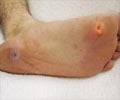
‘Seniors more likely to visit emergency department after home care visit from nurse.’
Tweet it Now
Compared with younger people, frail older adults visit the emergency department more often, have longer stays, more misdiagnoses, and are more likely to be admitted to hospital."There have been concerns that -- while striving for more efficiency -- home care has evolved to be task-focused without the kind of full-scope, comprehensive practice that could be integrated with responsive primary care," says Dr. Costa.
The study was conducted in Ontario’s Hamilton-Niagara-Haldimand-Brant region, which has the largest number of adults older than age 65 in the province. Researchers used home care billing records for 2015 to determine which home care services a patient received, then linked those data to emergency department records to determine if a patient visited the same day after 5 pm.
They found that patients who received home care visits from a nurse were more likely to visit the emergency department. The likelihood was greater among people who were not admitted to hospital or who had non-urgent scores for severity of illness that brought them to hospital.
"It’s difficult to determine the appropriateness of an emergency department visit, but we found stronger associations with less acute emergency visits. This suggests that some patients likely could have received care in less acute settings if it was available," says Aaron Jones, a study author and PhD student at McMaster under Dr. Costa.
Advertisement
Sometimes this is due to a "failure to cope" (called "the social admission" in the United States) and can lead to poor care from health care providers because of negative attitudes.
Advertisement
Source-Eurekalert












